I make slightly rustic custom hand-made tuning keys (sometimes called a tuning hammer or tuning lever).
My keys normally use a machined clock-key socket shaft, fitted into a hand-carved wooden handle. I can supply you with a bare socket, or I am happy to make a key specially to fit your harp. The price will depend on the amount of work that goes into your key, and there are many different choices!

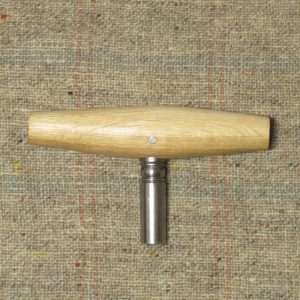
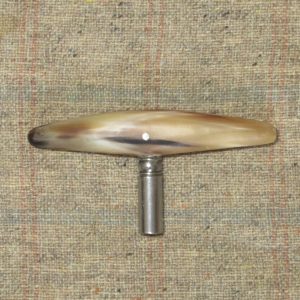
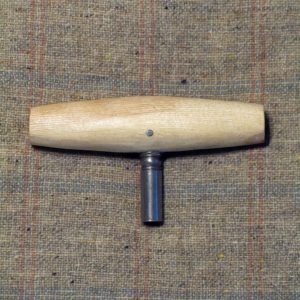

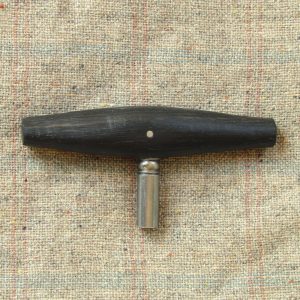


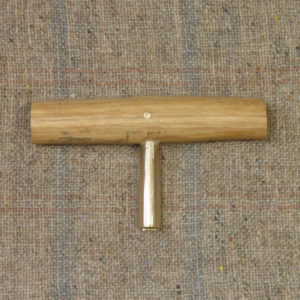



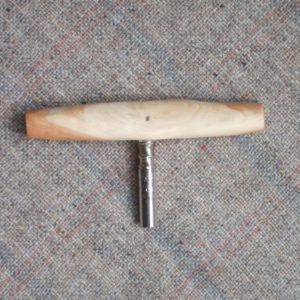
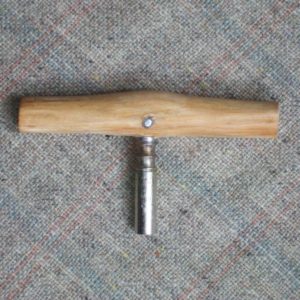
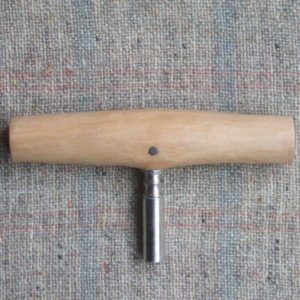












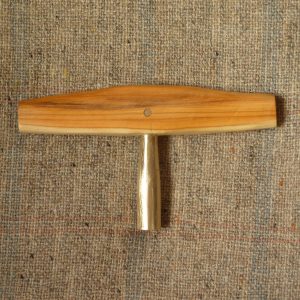
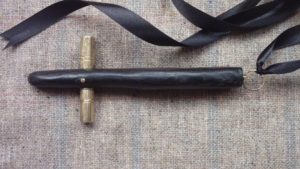






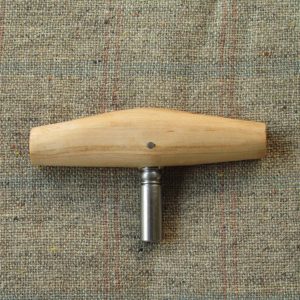

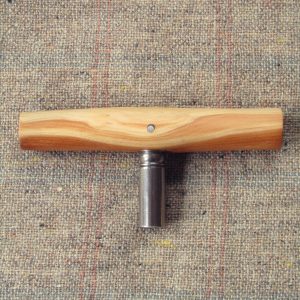
Socket Options
The socket needs to fit your tuning pins. It is important that you get the right size, because a loose socket makes it much harder to tune; also if the key is loose on the pins it may also damage the tuning pins or the socket. My chart shows the sizes I have available.
If you are not 100% sure what size you need, I can lend you a selection of plain sockets so you can try them on your pin drives and see which size fits your pins best. Or you can extract and send me one of your pins.
| Number | Width across flats | What each size is good for |
| 7 | 4mm | I have never seen harp tuning pin drives this small! |
| 8 | 4.25mm | |
| 9 | 4.5mm | |
| 10 | 4.75mm | No.10 sometimes fits the blackened steel lever harp / pedal harp pins, but it is often just a bit too tight. |
| – | 4.8mm | This is the size of the little brass radiator keys which are a good fit on the machined blackened steel pins. But their shafts are very short. |
| 11 | 5mm | No.11 is a slightly loose fit on the machined blackened steel pins. You really have to get a sample key and try it on your pins. |
| 12 | 5.25mm | |
| 13 | 5.5mm | Some traditional wire-strung Irish harps have slightly undersized drives, and a no.13 key might give a better action than the larger sizes. |
| 14 | 5.75mm | No.14 and no.15 are suitable for most traditional wire-strung Irish harp tuning pins with the large square tapering drives. No.14 is on the smaller size, and No.15 is on the larger size, but either should work fine with most pins. |
| 15 | 6mm | No.15 is perhaps my favourite size, including for the steel Egan tuning pins I have had made, as specified in my makers drawings for an Egan traditional wire-strung Irish harp. |
| 16 | 6.25mm | Because the traditional pin drives are tapered, you can use a size up or down no problem, though one size will give the “best” action for each set of pins. A no.16 key might be a better choice if your pin drives are especially wide. |
| 17 | 6.5mm | |
| 18 | 6.75mm | |
| 19 | 7mm | I have never seen harp tuning pin drives this big! |

The simplest way to get a nice socket is to use a commercially produced clock key and pull off the shaft. In the past I have tried cheaper brass or plated steel clock keys, but now I am using only these heavy duty steel keys which are made in England by John Wardle.
One reason I prefer not to use a brass socket is that brass is not as strong as steel, and it is possible for the socket to split. The socket can split if it is slightly over-size, so that the square corners of the pin drive put a force into the face of the socket; alternatively the socket can split if it is put onto a tapering drive and pressed hard (e.g. when setting the pins into the neck). The heavy duty steel sockets solve this problem and give a much more solid and positive tuning experience.
On the other hand, a steel socket can damage a softer brass pin. This can be a problem with the smaller classical-style tuning pins, where the drives are cut down parallel into the tapered shafts. The parallel drive faces means the key is never an exact fit; and the small size means there is more stress on the drive corners. This is not usually a problem with steel pins, but if you have the smaller classical-style pins made from brass, then it becomes a real danger, and I recommend you use a brass socket. That way the socket will fail before the pin drive, and it is easier to replace a socket than to replace all the pins.
You can use the bare clock key on its own as a pocket or keyring tuning key, or you can pull it apart to fit it into your own handle. I also have very short 4.8mm brass radiator keys available for £2 each; they can be used for keyring or novelty keys.
You can read my photo-essay on how I made a tuning key.
Handle
I can make you a complete tuning key by fitting one of the sockets (above) into a hand-made handle.
I make my handles from pieces of interesting wood, hand carved in a rustic style. Once you have chosen what socket you need, I can make a handle and fit the socket into it. I fit the socket into a hole in the handle, and pin and glue it to make sure it is solid with no movement.
My standard handle uses a plain wood (e.g. Irish birch, English alder, ot whatever I have a log of currently), and is made so that the key is a T shape, usually with a wider centre. A T shaped key like this costs £40 plus the cost of the socket of your choice (see above).
If you want something different, get in touch. I can use exotic woods or other materials; I have Scottish and English bog oak, Irish yew and oak, Scottish cherry, plus other logs which I have scavenged or found. I could also use something like horn or antler if you took a notion to that kind of thing. I can add carved or gilded or painted bands. I can add a suspension loop or silk ribbons. Please ask for prices.
How to order:

Send an email to shop@simonchadwick.net, or phone or text me, telling me what you would like.
Please note: postage is charged extra. Click here for payment information.
If you are not sure what you need, still get in touch and ask me. There is no commitment to place an order; just call or email and see if the price and description is really what you are after. I am happy to recommend other sellers who might have what you need.
